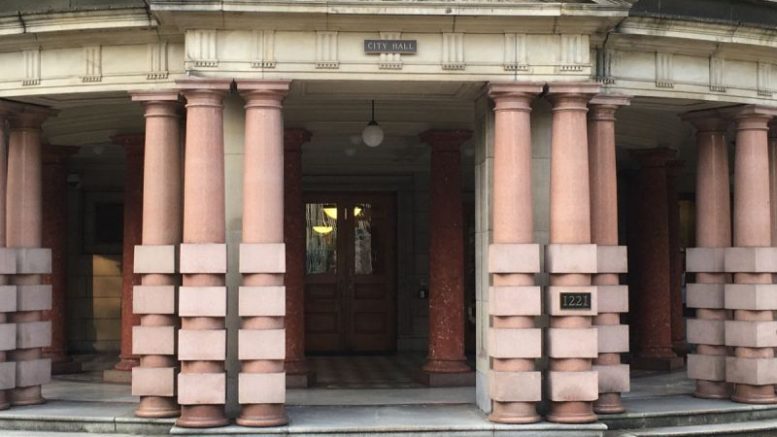“This is a case about unconscionable, illegal conduct creating insurmountable obstacles to success of black club owners, clubs catering to black people and clubs offering entertainment and playing music appealing to black people.”
That’s how a lawsuit filed on behalf of Donna Thames against the City of Portland starts.
Thames owned Exotica, a gentlemen’s club, from 2010-2015. She says she would still be operating the club were it not for institutional racism by the city of Portland. The suit was filed last week and first reported by Willamette Week.
It charges that the city, working with the Oregon Liquor Control Commission:
“Has a long and shameful history of knowingly and intentionally targeting black clubs with all of their regulatory power in a concerted effort to drive the clubs out of business.”
While the issues raised by Thames’ suit will eventually be decided by a jury, she raises a question that should be addressed by a city that prides itself on being progressive: just how deeply seated is racism in Portland?
“From the founding of the state of Oregon until the 1920s, it was illegal for black people to live anywhere in the state,” her suit says. “The state was openly marketed to Americans in the east as a white utopia. When black people were finally allowed to live in Oregon to satisfy the growing need for cheap labor, they were excluded from the existing social fabric and sought to form their own.
“That effort was met with violent opposition by the City’s large chapter of the Ku Klux Klan, and legal opposition by City officials, including the mayor and chief of police, who openly supported the Klan.”
Thames’ suit says that history led to the city and the OLCC using its power to “target and discriminate black clubs and force them out of business.”
She lays out a long history that goes back to 1946 when the The Dude Ranch Club was forced out of business.
More recently, she says there have been others including the Cleo-Lillian Social Club on North Williams in 2001 and LV’s Sports Bar Restaurant and Lounge, which shuttered in 2012 after the OLCC brought a second attempt to suspend its license. Soon after it was demolished to make way for a luxury office building.
Thames also brings up the Crown Room (2009), which she says used to have regular hip-hop nights and received “an inordinate amount of regulatory attention: and eventually shut its doors. It’s white owner currently has clubs downtown, none of which cater to black people and none of which has had regulatory problems.”
There was the Beauty Bar (2010), Seeznin’s Bar & Lounge (2011) and Fontaine Bleau (2013) – whose owner has also filed his own, similar suit in federal court.
The suit also quotes Portland Police Lt. Todd Wyatt who, after a 2006 shooting four blocks from a rap concert, said: “It’s not a coincidence that all these shootings happen after a rap concert. We don’t want to say that because we don’t want to be labeled as racist, but if you line up the shows, and line up the numbers, there’s a correlation.”
Thames points out that there were 27 homicides in the city that year, and none were connected to a rap concert.
Portland is currently 6.3 percent black. There are three black-owned clubs or bars in the city.
Which brings us to Thames’ specifics about her own situation.
Thames says that she employed between 15 and 20 salaried employees and nearly 100 independent contractors. Her annual payroll was $360,000.
Just months after becoming the owner of Exotica, OLCC gave her a liquor license, with conditions. She was told she would have to have three security officers on duty most nights and four on weekends. Security would have to patrol the parking lot every 15 minutes. Patrons would not be allowed to be in possession of more than one drink at a time, so no going to the bar to get a drink for your friend.
After two years in business, with no administrative or legal violations, she asked the OLCC to remove the restrictions — it refused. According to the suit, OLCC officials never even brought the request to the commission for consideration.
Meanwhile, another business nearby, Skinns, operated by a white person, experienced two homicides and a shooting with two other victims in three separate incidents and never faced a single restriction.
And Skinns is far from the only bar serving a predominantly white clientele that have not had to deal with the same restrictions as Exotica did. This includes establishment where there multiple murders, shootings and scores of calls for the police over the course of a year.
Thames says that things kept getting worse for her.
In 2014, OLCC officials came to “ostensibly review video of a patron who had been arrested.” Thames, feeling intimidated, asked to record the interaction, and while they said yes, they then demanded that she turn over he cellphone saying it was “evidence” in their “criminal investigation.”
When she refused, she was arrested. The Multnomah County District Attorney eventually dropped the charges, noting that the arrest was unwarranted.
Over the next year, Thames said she continued to ask for the restrictions to be lifted but never received a response.
Things spiraled out of control in April 2015, when the club’s trained security officers denied entry to about a dozen members of the Hoover Crip gang. Gang members were not allowed inside and, based on their attire, the security officers were fairly certain of their affiliation.
While the gang members complied, one went to his car, got a gun and opened fire on people in the parking lot. Two people were wounded, no one was killed. This was the first time there had been an incident involving gun fire at or near the club.
Days later, Thames received a letter from the police saying they were invoking the city’s time place and manner regulations – which allows the city to impose greater restrictions on establishments – and she needed to propose what she was going to do to make things better.
Thames wrote back pointing out that the incident had happened outside the club after her security staff had refused entrance to people. She said that she wished her staff had alerted police earlier about the gang members trying to get in, but they were educating staff to be better prepared. She closed by pointing out the work she had done with the gang task force.
She didn’t hear anything for several weeks until she was summoned to city hall where she was told, without discussion, that the club would be required to close at midnight for 90 days. She was told the club needed a “prolonged cooling off period” because of the serious incidents at the club.
Thames says that she kept trying to initiate a dialogue with OLCC and the city, which she says was unsuccessful.
By last July, Thames says, she “was at the end of her rope. Like numerous black club owners in Portland before her, she gave up and closed her business — after operating her business for nearly five years with a spotless regulatory record.”
“In 2015, the Portland Police Gang Taskforce reported 182 gang shootings, stabbings or assaults in Portland,” the suit says. “On information and belief, none of the businesses in the vicinity of such violence were targeted for the imposition of the crippling time, place and manner restrictions that the City sought to impose on the Club.”
A month after she closed to club, and three months after her club was deemed a danger requiring a “prolonged cooling off period,” she was notified by the city that there would be a hearing and she’d be notified “once scheduled.”
Thames says that she lost her investment, her income, her chance for profits, that she suffered emotional distress and damage to her reputation.
Portland does a lot to live up to its reputation of being a place where progressive ideals live. At the same time, Thames’ suit lays out a history that raises questions.
Get free real-time news alerts from the Portland Patch.
Source: patch.com





Be the first to comment on "About Portland: Lawsuit Asks City to Confront History of Racism"